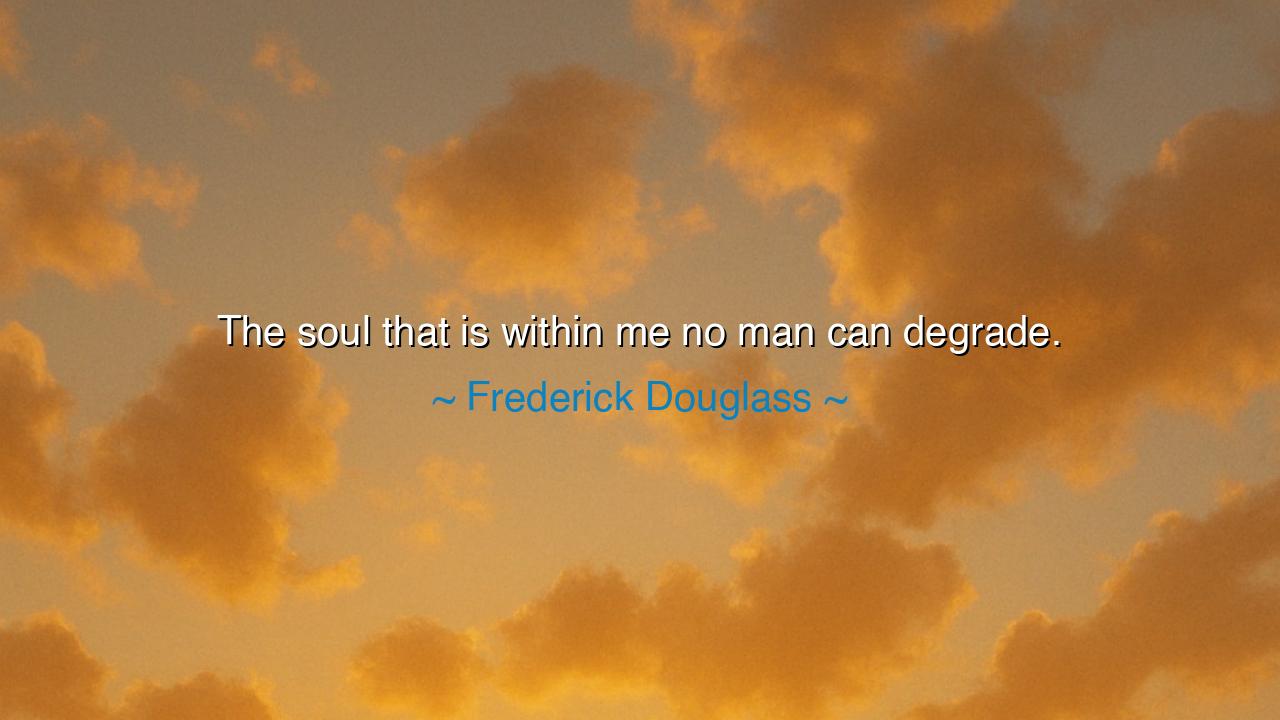
The soul that is within me no man can degrade.






Frederick Douglass, born into chains yet destined for freedom, once declared with thunder in his voice and fire in his heart: “The soul that is within me no man can degrade.” These words, born from the crucible of slavery, are more than defiance—they are an eternal proclamation of the dignity of the human spirit. Douglass, who had been beaten, silenced, and denied his very humanity, rose to remind the world that while the body may be shackled, the soul remains unconquerable.
When he speaks of the soul, he names that eternal spark within every human being which cannot be bought, sold, or broken. Masters could whip his flesh, deny him knowledge, strip him of rights, but they could not reach that inner essence. That place within him—of courage, of hope, of identity—remained untouchable. In this declaration, Douglass gifted the oppressed of every age a weapon mightier than steel: the knowledge that dignity lives not in outward status, but in the inward strength of the spirit.
The word degrade here is crucial. To degrade is to strip away worth, to reduce a person to less than human. This was the aim of slavery: not only to control bodies but to crush spirits. Yet Douglass stands as proof that such efforts fail before the invincible soul. His very life was the embodiment of this truth. Once forbidden even the act of reading, he taught himself letters in secret and grew into one of the greatest orators of his century. His soul was not degraded—it was exalted through the very struggles meant to destroy him.
History gives us many such examples. Think of Socrates, condemned to death by his own city, forced to drink hemlock. The state sought to silence him, to end his life, but could not touch his soul. In his final hours, he spoke calmly of truth and immortality, leaving behind teachings that have endured for millennia. Like Douglass, Socrates revealed that the soul, once awakened, cannot be degraded by the cruelty of men.
The deeper meaning of Douglass’s words is this: your worth does not depend on the opinion of others. No insult, no oppression, no rejection can touch the inner dignity that resides within you. This is the secret of true freedom: to know that your soul is sovereign, that its light cannot be dimmed by external darkness. To forget this is to live enslaved even when free; to remember it is to be free even when enslaved.
The lesson, then, is clear: guard your soul. Do not let hatred corrode it, nor despair consume it, nor the cruelty of others define it. They may strike at your body, your name, your possessions, but they cannot touch the essence of who you are unless you surrender it. Keep it unyielding, keep it noble, keep it free. For as Douglass reminds us, no man—not tyrant, not master, not enemy—has power to degrade what the Divine has placed within you.
Practically, this means: walk through life with quiet courage. When insulted, do not let it define you. When oppressed, hold fast to your dignity. When tempted to see yourself as small, remember Douglass’s truth: your soul is beyond the reach of degradation. Nurture it with knowledge, protect it with integrity, and strengthen it with faith. For your soul, once guarded, becomes a fortress no man can breach.
So let us pass down Douglass’s cry: “The soul that is within me no man can degrade.” This is the anthem of freedom, the shield of the oppressed, the banner of every heart that refuses to bow. Carry it, live it, teach it—so that all may know: the soul is sovereign, and in its sovereignty lies the unconquerable strength of humanity.






AAdministratorAdministrator
Welcome, honored guests. Please leave a comment, we will respond soon